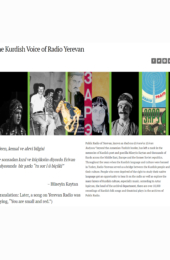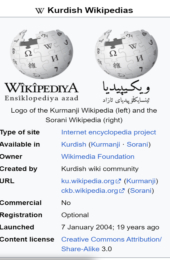The Kurdish Voice of Radio Yerevan
Public Radio of Yerevan, known as Radyoya Erîvané or Erivan Radyosu* beyond the Armenian-Turkish border, has left a mark in the memories of Kurdish poet and guerilla Hüseyin Kaytan and thousands of Kurds across the Middle East, Europe and the former Soviet republics. Throughout the years when the Kurdish language and culture were banned in Turkey, Radio Yerevan served as a bridge between the Kurdish people and their culture. People who were deprived of the right to study their native language got an opportunity to hear it on the radio as well as explore the many layers of Kurdish culture, especially music. According to Artur Ispiryan, the head of the archival department, there are over 10,000 recordings of Kurdish folk songs and theatrical plays in the archives of Public Radio.
Zarok TV
Zarok TV (English: Kid TV[1]) is the first Kurdish satellite television station in Turkey for Kurdish children, broadcasting since 21 March 2015, based in Diyarbakır (Amed). The channel broadcasts programs in various Kurdish languages, specifically Kurmanji, being the most widely spoken Kurdish dialect in Turkey, Zazaki and some Sorani.[2][3]
Accused of “separatist and subversive” activities, it was shut down on 29 September 2016 under the emergency statutory decree issued during the aftermath of 15 July's failed coup d'état, alongside 12 other television and 11 radio stations, when the police raided the television station's headquarters.[4][5][6][7][8] Zarok TV's director, said there were no warning before the closure.[9]
In November 2016 the TV station was allowed to broadcast again after much criticism for the sudden closure. The European Parliament condemned the Turkish authorities stating “misusing” law in the aftermath of the unsuccessful coup attempt. Owner of Zarok TV and also several other cultural Kurdish TV channels, estimated the company had lost “125-150 thousand dollars” in October due to closures.[10]
Rûdaw
Rudaw Media Network (Kurdish: تۆڕی میدیاییی ڕووداو, romanized: Tora Medyayî ya Rûdaw), is a major media broadcaster in the Kurdistan Region, Iraq.[2][3][4]
Rudaw Media Network, headquartered in Erbil, the capital of Iraq's Kurdistan Region, operates as a global media powerhouse with correspondents strategically positioned across the Middle East, Europe, and the United States.
This multi-faceted media outlet delivers content in various languages, including English, Kurdish, Arabic, and Turkish.[5]
History
Rudaw Media Network originated as a weekly print newspaper distributed in the Kurdistan Region and Europe, the network initially garnered international attention through its European edition, catering to the burgeoning diaspora communities of that era. In a noteworthy commitment to environmental sustainability, Rudaw transitioned from print to a fully digital format, discontinuing its newspaper publication.
The network's diverse portfolio includes a weekly newspaper in the Sorani dialect, boasting a circulation of 3,000, a Kurmanji version circulated in Europe, a comprehensive website available in Kurdish, English, Arabic, and Turkish, and a satellite TV station. Rudaw Media Network is funded and supported by Rudaw Company, with a primary mission to disseminate news and information concerning Kurdistan and the broader Middle East region.
In the present day, Rudaw Media Network has expanded its reach to include a radio news channel broadcasting on shortwave throughout the Middle East. Furthermore, its live stream is accessible to global audiences online. Notably, in 2023, the network introduced its podcast portal, featuring a diverse array of podcasts spanning topics such as culture, news, politics, economics, and technology.
Kurdish Wikipedia
Kurdish Wikipedia (Kurmanji Kurdish: Wîkîpediya kurdî, Sorani Kurdish: ویکیپیدیای کوردی) refers to two Wikipedia editions which are written in two forms of Kurdish language; Kurmanji and Sorani.
The original one was founded in January 2004. As of December 2023, the Kurmanji Wikipedia has 73,702 articles and Sorani Wikipedia has 52,794 articles.[1] There are also two other Wikipedia editions for Zazaki and Southern Kurdish with the latter still in the test phase.
History
The Kurdish Wikipedia established on January 7, 2004,[2] designed to contain articles in Kurmanji and Sorani at the same time. On August 12, 2009, Kurdish Wikipedia separated into two versions due to technical and linguistic issues. The old version (ku.) remained as Kurmanji Kurdish Wikipedia and a new version (ckb.) created for Sorani Kurdish Wikipedia.



